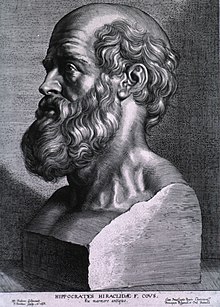Hippocrates
Hippocrates of Kos | |
|---|---|
Ἱπποκράτης | |
 Engraving by Peter Paul Rubens, 1638 | |
| Born | c. 460 BC |
| Died | c. 370 BC Larissa, Ancient Greece |
| Occupation | Physician |
| Era | Classical Greece |
| Title | The Father of Western Medicine |
Hippocrates (c. 460 – c. 370 BC)[1] was a Greek doctor who is called the "father of medicine".[2][3][4] He was the first person to teach that people got sick for scientific reasons. Previously, people believed that disease was caused by angry gods.
Many of Hippocrates' writings are still important to doctors. For example, patient confidentiality, meaning that doctors can only discuss a patient with the patient themselves. Another of his ideas is to never knowingly lead a patient to suffering or death. These kinds of ideas are part of medical ethics.
The Hippocratic Oath is named after him. This is a set of rules which doctors promise to obey. We don't exactly know what the original was, but this is an example of a modern Hippocratic Oath: I do solemnly swear by all I hold most sacred:
- that I will be loyal to the profession of medicine and just to its members
- that I will lead my life and practice my art with virtue and honor
- that into whatsoever home I shall enter it shall be for the good of the sick and the well by the utmost of my power and that I will hold myself aloof from wrong and from corruption and from the tempting of others to vice
- that I will exercise my art solely for the benefit of my patients, the relief of suffering, the prevention of disease and promotion of health, and I will give no drug and perform no act for an immoral purpose
- that in the treatment of the sick, I will consider their well-being to be of a greater importance than their ability to compensate my services
- that what I may see or hear in the course of treatment or even outside the treatment in regard to the lives of persons which is not fitting to be spoken, I will keep inviolably secret
- that I will commit myself to a lifetime of continued learning of the art and science of medicine
- these things I do promise and in proportion as I am faithful to this oath, may happiness and good repute be ever mine, but should I trespass and violate this oath, may the reverse be my lot.
The oldest version we have is AD 275, and that is just fragments.
References
[change | change source]- ↑ /hɪˈpɒkrəˌtiːz/; Greek: Ἱπποκράτης; Hippokrátēs
- ↑ Grammaticos PC, Diamantis A (2008). "Useful known and unknown views of the father of modern medicine, Hippocrates and his teacher Democritus". Hell J Nucl Med. 11 (1): 2–4. PMID 18392218.
- ↑ "Hippocrates". Microsoft Encarta Online Encyclopedia. Microsoft Corporation. 2006. Archived from the original on 2009-10-31. Retrieved 2016-03-09.
- ↑ Strong, W.F.; Cook, John A. (July 2007), "Reviving the Dead Greek Guys" (PDF), Global Media Journal, Indian Edition, archived from the original (PDF) on 2012-05-15, retrieved 2016-03-09
